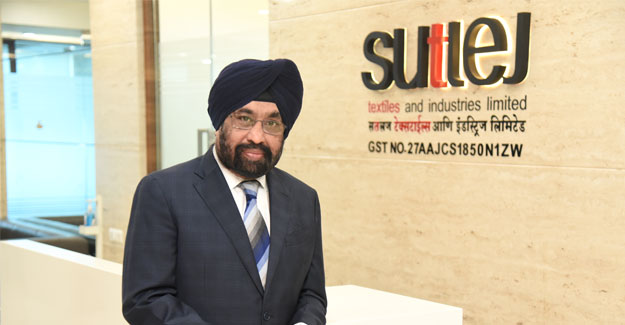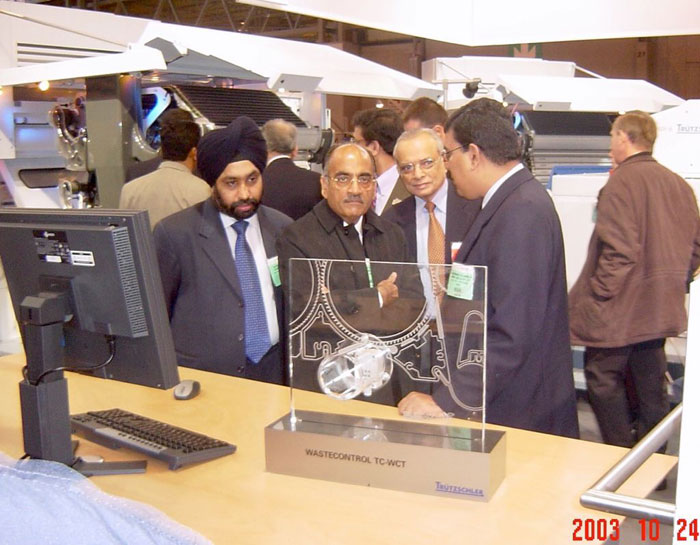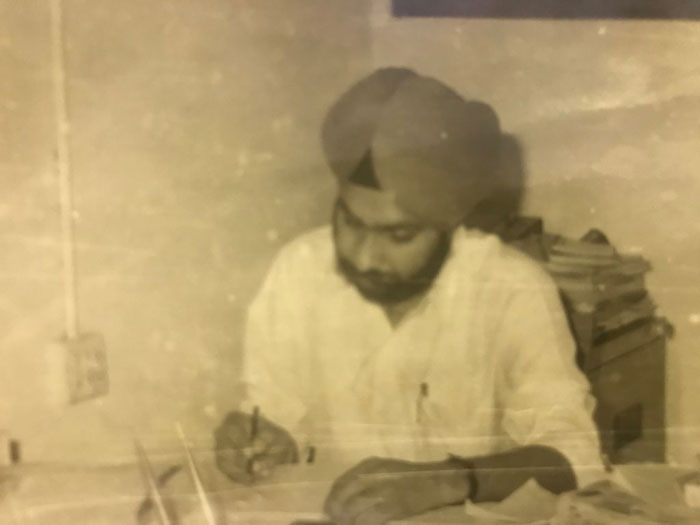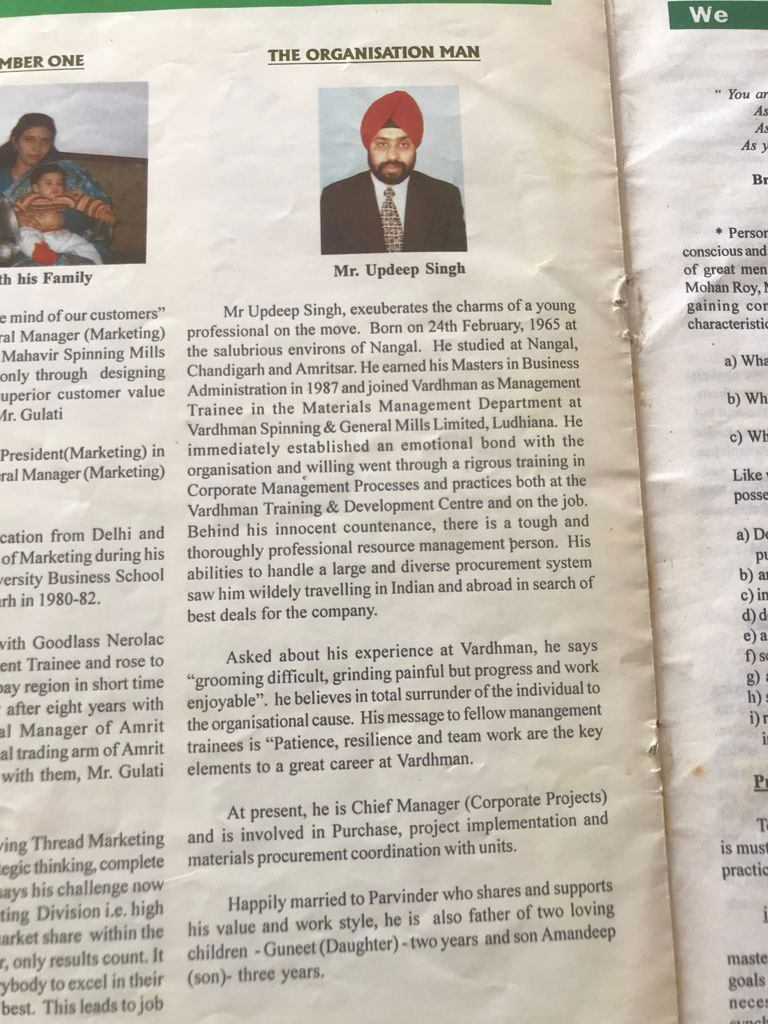
Passion, Hard Work, Smart Work Is The Way To Success
Updeep Singh, President & CEO, Sutlej Textiles, has indeed been a trailblazer in the textile industry, introducing today’s taken-for-granted management tools in the industry way back in the ‘90s when the old school prevailed. We present to you the first part of Updeep Singh’s eventful, albeit ardous journey, starting in 1987.
Sutlej Textiles & Industries Ltd., established in 1934, has evolved into a one-stop textile solutions provider to the industry. With a wide product range of yarns, fabric and home textiles, the company has been focussed on sustainability and innovation through the years.
Updeep Singh, President & CEO of Sutlej Textiles, has upon his shoulders the immense responsibility of taking forward the legacy of the company, building it into one of the most reputed textile brands, the most sought-after employer in the industry, a valuable asset for all stakeholders.
[caption id="attachment_23559" align="alignnone" width="700"] Updeep Singh, with Mr S.P. Oswal, Chairman, Vardhman Group, and Late Mr. Atul Bhagwati, Promoter of A.T.E. Enterprises, on 24th October, 2003, at ITMA in UK.[/caption]
“These are times of great transformation. If the pandemic had not created this havoc, my goals would have been loftier, it would have been a straight growth trajectory for Sutlej. Now, my immediate goal is to get the company to pre-lockdown levels of 2019,” shares Mr Singh. He is building a talent pool to take the company to the next level. Innovating products and processes is equally important for him, to ensure long term growth of the company.
Updeep Singh, with Mr S.P. Oswal, Chairman, Vardhman Group, and Late Mr. Atul Bhagwati, Promoter of A.T.E. Enterprises, on 24th October, 2003, at ITMA in UK.[/caption]
“These are times of great transformation. If the pandemic had not created this havoc, my goals would have been loftier, it would have been a straight growth trajectory for Sutlej. Now, my immediate goal is to get the company to pre-lockdown levels of 2019,” shares Mr Singh. He is building a talent pool to take the company to the next level. Innovating products and processes is equally important for him, to ensure long term growth of the company.
“I enjoy the role where the buck stops; where I can shape the lives of others, where my decisions impact the life of others for good.”'The Buck Stops Here' Mr Singh has always coveted a position where the buck stops, and at Sutlej more than at any other of his work places, is this truer. He realises the importance of keeping a company on the growth path. “It is this growth trajectory that has made some companies so attractive for investors and employees. This industry does not let you get complacent. That’s what I love about it.” It’s not been an easy journey for Updeep Singh. “It’s been a long, interesting, sometimes difficult journey, dotted with successes but also pitfalls. And on the way, I’ve learnt many valuable lessons – the power of relationships, being truthful first and foremost to yourself and your work, gratitude, empathy. I’ve been blessed to have excellent mentors in this industry, who taught me the true value of hard work. One of my many aspirations has been to make a meaningful impact on the lives of at least some people, and I have been successful in this. There is still a long way to go.” We show you a glimpse of Mr Updeep Singh’s professional journey. An unattractive gate that led to great success The unattractive main gate of Ludhiana’s Vardhman Group was almost the reason why Updeep Singh wanted to skip the campus interview as a management trainee back in 1987. Little did he know that this gate would be his gateway to great success in the textile industry. Luckily, his professors knew better. “Either appear for the Vardhman campus interview, or you are free to skip all campus interviews of all the potential recruiters,” was the diktat. “So I had no option but to go for the campus interviews, I successfully cleared all the interview rounds, eventual trainings, etc of one year. In hind sight I realised that I had started my career with one of the best textile conglomerates in the country.” Gratitude “I’ve had the opportunity to work with the best leaders in the industry, to learn from them, to have them as my mentors. I’ve been blessed to have mentors such as Late D.L. Sharma, and of course Oswalji himself. “As assistant manager, I was honoured to be accepted into the Lunch Club which included the who’s who of Vardhman Group – Mr V.K. Goyal - Chief Executive, Late Mr Z.S. Chaudhari – Group IT, Late Mr D.L. Sharma. And I remained a part of this club from 1990 to 2005. This was a great privilege for me, and also helped me gain tremendous business insight and learnings, building a strong foundation for me.” “And then there was the spirit of achieving something, being passionate, committed and dedicated to my work, thinking fast, and out-of-the-box, yearning to always stand out and get noticed for the right reasons. And God has been kind to place me in the right place at the right time.” 'It’s Never Crowded Along The Extra Mile' The Electronic Typewriter “My early posting in the company was in the materials department, a very traditional department at that time. The half-yearly and annual reviews were a systematic affair at the company even in those days. I was a junior manager then. And I made the department review which the departmental head would present to the chairman in the meeting. “I did a few things differently. I compiled the report, around 15-20 pages, and got it electronically typed, paying Re 1 per page, from my own pocket. The company, at that time, had manual typewriters. “The presentations were done on a projector, but the slides had to be made manually, by cutting sheets of plastic. So, I made the review in that manner. And when my boss presented the review, Oswalji, the chairman said, `I would like to meet the person in your department who made this review’. “And I, a junior executive, was called into that high level meeting. That was the first important milestone for me.” “Think big, think fast, think ahead” – Updeep Singh certainly reaped the benefits of this. [caption id="attachment_23560" align="alignnone" width="700"]
 Updeep Singh at the beginning of his career in 1998/99.[/caption]
A few more hours at work isn’t that bad
Another opportunity presented itself soon enough. “At that time, we had 9-5 jobs, people would usually leave by 5 or 6 pm. My mentors, who were super senior - of executive director level, had told me that if I am serious about my career, these are the years to work hard. `So stay back, spend a couple of hours after work to learn how things are done. Go and learn how the machines operate,’ were their words to me.”
Mr Singh’s family too believed in and supported the virtue of hard work. `If you are supposed to work for 10 hours, work for 12 hours’, he was taught.
This advice came in good stead for Updeep Singh. “One such evening, the chairman wanted some data, there was no one in the department, except I. I didn’t know much about the file or the information he needed. Nonetheless I dug it out, with help from some people, on the phone. My boss was not pleased that I was still in the office. So anyway, armed with the file and the information, I went to the chairman. He asked me a few questions. And he understood that I could present well.
“These two incidents were the beginning of my career path in the textile industry.”
'Be so good they can’t ignore you'
“Mr Oswal, who I consider my `professional father’ had taken the decision that I be given more responsibilities in the company, that I should grow in the company, and have a career path. He was investing his time and money to hone me, which only spurred me to work harder, better, smarter. He kept giving me the opportunities, I kept grabbing them.
Updeep Singh at the beginning of his career in 1998/99.[/caption]
A few more hours at work isn’t that bad
Another opportunity presented itself soon enough. “At that time, we had 9-5 jobs, people would usually leave by 5 or 6 pm. My mentors, who were super senior - of executive director level, had told me that if I am serious about my career, these are the years to work hard. `So stay back, spend a couple of hours after work to learn how things are done. Go and learn how the machines operate,’ were their words to me.”
Mr Singh’s family too believed in and supported the virtue of hard work. `If you are supposed to work for 10 hours, work for 12 hours’, he was taught.
This advice came in good stead for Updeep Singh. “One such evening, the chairman wanted some data, there was no one in the department, except I. I didn’t know much about the file or the information he needed. Nonetheless I dug it out, with help from some people, on the phone. My boss was not pleased that I was still in the office. So anyway, armed with the file and the information, I went to the chairman. He asked me a few questions. And he understood that I could present well.
“These two incidents were the beginning of my career path in the textile industry.”
'Be so good they can’t ignore you'
“Mr Oswal, who I consider my `professional father’ had taken the decision that I be given more responsibilities in the company, that I should grow in the company, and have a career path. He was investing his time and money to hone me, which only spurred me to work harder, better, smarter. He kept giving me the opportunities, I kept grabbing them.
“I believed then and still do today, no work is small or big. In the early days of my first job, when most youngsters would enjoy their evenings and sleep till late in the mornings, I used to sleep at 8pm, to get up at 3am, to leave the house at 4am, to buy fuel for the boilers which was available only till 5am. I did this for two years, and never felt this was a menial job. “So, there were opportunities, there were efforts, there was guidance.” But was it all smooth sailing? “No, of course not. A management trainee was not quite well received in those days, old schools of thought prevailed. In such an environment, I had to work differently, build and maintain relationships with all earnestness. There was no substitute for hard work.” The big jump In early 1990s, Mr Oswal created a department – Corporate Projects & Purchase. “Vardhman wanted to centralise all purchases and projects, and I was inducted in this department. By 1994, I was handling 4-5 projects simultaneously. In 2000, we had some 15-16 manufacturing units. And in a year’s time, we centralised all purchases, right from a broom, a worker’s cap to the biggest of machines. “After this success, I was promoted to vice president in 2001.” Success is a result of preparation, hard work and learning from failure. “As I said, there were pitfalls along the way, some wrong decisions, some hasty decisions without due diligence, I want to say that’s the result of being young and impatient. That had its own learnings which have stayed with me for life.” Corporate culture hones leaders, corporate culture matters “Vardhman’s corporate culture and ethics was a very important factor in my future success, and all-round growth. To again share the kind of opportunities that were made available to me. At Vardhman, the rule was that we could not buy anything which we have not seen being made. I had to buy machines, parts, spares. This meant visiting the machine manufacturers. There is not a single machine or spares or accessories manufacturer that I have not visited several times, spent time in their factories to see the process. I’ve spent weeks in the factories of bobbin manufacturers to understand what a bobbin is, what it does, and then come back to our factory to see it working on our shopfloors. “In the process, I developed relationships in the industry. A strong corporate culture creates fine leaders.” [caption id="attachment_23561" align="alignnone" width="768"]“I love that this industry does not allow you to be complacent. It gives you the opportunity to understand and learn the vastness of this sector, makes you a complete man. I’ve learnt in-depth about every segment of the value chain, right from the fibre to the customer. There are so many variables in this industry, and you have to be conversant with all of it to be able to add value across the chain in an organisation. This industry makes you a `people’ person.”
 His work ethics, aptly described in the January 1998 in-house journal of Vardhman Group.[/caption]
Striving for a work-life balance
“When my daughter was born, I was just two-and-a-half hours away from Ludhiana, but I could not be there, as I had to be hands-on on the projects.
“I will say I have put my work before myself and my life. I do not have words to convey the kind of unconditional support my family has given me so that I progress without a hitch.”
At Sutlej, and in companies before that too, Updeep Singh has made it a point to honour the silent workers – the families that stand steady behind the employees. I am inspired by Indra Nooyi, and follow one of the management tools that she wrote about. It’s proven very effective. I always acknowledge the contribution of the families of the professional employees. I even write to the families about the person’s contributions in the company. This has proved to be a very powerful tool.”
For Mr Singh, building a corporate culture, a culture of performance, of passion, of recognition – is important for the future of the company.
(To be continued)
His work ethics, aptly described in the January 1998 in-house journal of Vardhman Group.[/caption]
Striving for a work-life balance
“When my daughter was born, I was just two-and-a-half hours away from Ludhiana, but I could not be there, as I had to be hands-on on the projects.
“I will say I have put my work before myself and my life. I do not have words to convey the kind of unconditional support my family has given me so that I progress without a hitch.”
At Sutlej, and in companies before that too, Updeep Singh has made it a point to honour the silent workers – the families that stand steady behind the employees. I am inspired by Indra Nooyi, and follow one of the management tools that she wrote about. It’s proven very effective. I always acknowledge the contribution of the families of the professional employees. I even write to the families about the person’s contributions in the company. This has proved to be a very powerful tool.”
For Mr Singh, building a corporate culture, a culture of performance, of passion, of recognition – is important for the future of the company.
(To be continued)

Textile Excellence
If you wish to Subscribe to Textile Excellence Print Edition, kindly fill in the below form and we shall get back to you with details.












